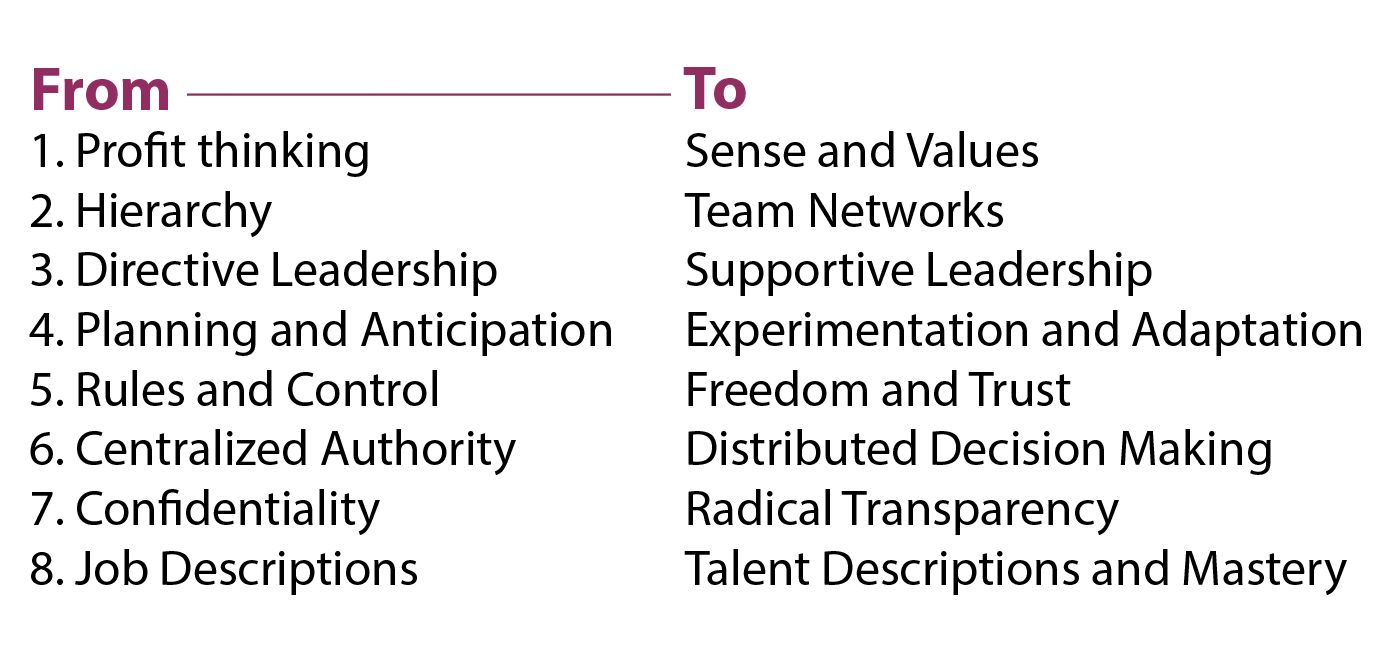In many organizations, change can actually begin immediately, and almost everything can be changed within a few years. This was said by Pim de Morree from Eindhoven (Netherlands) as part of the online congress ‹New Work Medicine› on February 19, 2021. He has experienced this in dozens of organizations worldwide with his Corporate Rebels initiative – and he radiates this energy himself.
Three principles are essential: find people who want change. Proceed in small, achievable steps. Generate a movement from this that many can support. Depending on the radical nature of the change, 20–50 percent will leave the company, because more freedom and more responsibility can also be perceived as exhausting and threatening. CEOs, too, are often unsettled at first, because their role changes significantly, and status is abolished in many respects. If it succeeds, however, the gain in agility and loyalty is enormous.

Eight Transformations
What is this about? On their journey through the inner workings of more than 100 companies in search of pioneers of the so-called ‹New Work›, the Rebels (as Pim de Morree and his employees call themselves) have observed eight transformations that characterize progressive companies: meaning and values replace profit; networks and teams replace hierarchy; instead of leading, they want to support leadership; you don’t want to make more plans, you want to experiment; Rules and control are replaced by freedom and trust; the central authority is redeemed by distributed decision-making authority; secrecy becomes radical transparency; and task descriptions become talents and championships.
As an example: It is impressive when Pim reports how Jos de Block from Buurtzorg1 has revolutionized care in the Netherlands. Today, 15,000 employees have completely self-organized into small teams in order to develop their vision of humane care and to have more time for those in need. From the beginning (2006), Buurtzorg had the goal of «helping patients at home become healthy and autonomous». A guiding ideal was reducing bureaucracy and simplifying everything to what is really needed. A major help in this was the establishment of their own IT program, which not only takes over daily documentation but also helps make communication between caregivers and relatives as transparent as possible. Professional exchange of employees also takes place via this program, so that handovers can be simplified. In this process, leadership has increasingly turned into coaching work, which is currently being done by 21 coaches at Buurtzorg. «To this day, the guiding question has remained with us: What can we do to provide patients with the best possible healthcare? This is exactly the right question to empower employees,» says Jos de Block. Success is not only recognizable in monetary terms (about 40% cheaper than previous care providers), but is particularly evident in employee satisfaction.
Another example is the path of Darren Childs, CEO of the English TV channel UKTV, who had office walls torn down in order to improve cooperation between ‹creatives› and the management. In weekly meetings with all 250 employees, goals, figures, and major developments were made transparent. Since hardly anyone dared to ask questions in the large group at first, an anonymous question box was set up, which was then emptied and answered at the meetings. An additional step was to introduce the evaluation of managers by employees, which helped to achieve a climate of equality – through training or by transferring managers. This process took about five years to transform the company, with the active consent of the executives. But Pim also reports on cases where the starting point of change was started from small departments and spread to over 80 percent of the workforce. If something works well, then you are asked about it, and word gets around.

Become a Rebel
According to Pim, up to 85 percent of employees worldwide do not feel connected to their work, and about 40 percent do not find that what they produce or offer as a service to be future-oriented. «If we continue like this, more and more people will get sick from their work.» This coincides to some extent with the introductory statements of the doctors at the ‹New Work Medicine› congress. Around 10 percent of the medical doctors in Switzerland throw in the towel every year, and one in three doctors feels burned out. When diagnosing why this development is evident in the healthcare sector, the economization of the system comes first. Pim’s eyes sparkle: «Become rebels!»

It is time for sustainable values instead of profit. In addition to the eight transformations mentioned, one could certainly also find other trends that correspond to these change processes: for example, the question of the appropriate form of ownership of such companies in the sense of unsaleability; or the question of the appropriation of profits – fairer redistribution and true cost accounting. I, too, suggest: join in and start the first steps of change in your company tomorrow!
Cover photo: ‹Corporate Rebels› Founders Pim de Morree and Joost Minnaar. Photo: Corporate Rebels, z.V.g – Translation: Monika Werner
Footnotes
- How work makes you happy, in: ‹Das Goetheanum› 3–4/2020.






This is a great topic to explore but I fail to find any critical investigation here from the perspective of social three-fold or spiritual science. Many of Joost and Pim’s ideas are progressive with an odour reminiscent of Critical Theory virtue-signalling, which is a common and dangerous pitfall. The world over we are confronted with the call to swap corporate overlording with government forced special-interest overlording. Perhaps this is not what they intend at all, yet there are some indications of this direction. No thanks. Perhaps just a slight shift in their ideas and careful libertarian critique could produce categories something as follows:
1. selfish profit to human profit
2. entitled hierarchy to competence hierarchy
3. demand leadership to discourse leadership
4. planning and experiment are both needed and are complementary
5. rules and control to responsibility and trust
6. ok, centralized to distributed happens with 5, along with deregulation.
7. is enforced disclosure meant? we can use libertarian law for deception.
8. sort of ok but the key point here is competence and responsibility.
Exploring these comments a little further with reference to Corporate Rebels website, I have the following challenges:
1. “not hiring based on skills, but also hiring for culture” reeks of Critical Theories’ Diversity, Equity and Inclusion program, a systematic program of racial discrimination, non-competence award and revenge-based persecution. This is extreme Leftist ideology that is currently eroding global social and economic health, and is quite the opposite of social three-fold.
2. “the rigidity of command and control does not produce agility, speed and engagement”. Not true. But it should also include ‘skin in the game’. Endless examples eg. Elon Musk, Steve Jobs.
3. “Authority is no longer linked to rank.” This is true if hiring is no longer linked to competence. This is related to their point 6.
4. “Plan and predict… are based on the false belief that we can predict the future.” This is untrue, both broadly and concretely. Not only do we know the sun will rise again and people will eat, we can also imagine a future and make something of it happen. That’s what goals are.
5. The key ingredient to freedom, which they mention under point 6. should be expressed here, namely responsibility and accountability.
6. “This suggests that decision-making competence rises with position in the hierarchy. This is obviously nonsense.” No it is not, if the position in the hierarchy is ACTUALLY based in competence. I’ll take the lead surgeon decision over the intern, thanks.
7. This is a nuanced point with possible assumptions that transparency will improve ethical or desirable progress among other things. But ethic depends on world view, which is not necessarily explicated in supposed disclosure. Disclosure itself doesn’t guarantee anything.
8. “They offer people the freedom to choose their tasks and responsibilities.” Ok, to a point. Good management will recognize potential and engage dialogue on possible opportunities. But it is not just a matter of freedom. Although business includes elements of the social sphere (freedom), it is principally about cooperation, mastery and revealing individuality in producing what is needed. And sometimes you just need to do your job, and do it well.